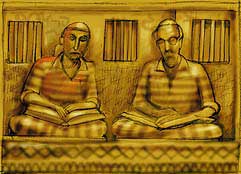Article from The Jerusalem Report:


The
Jewish Club in Cell Block 2
By Tibor Krausz / Bangkok

(Avi Katz)
|
(December 20, 1999) Drug runners study Torah,
eat kosher - and pray for amnesty amid the horrors of Bangkwang
jail
Shimon Dahan is doing time, he insists, "for a flower." It’s
not botanical interests, however, that made the 67-year-old
French-born Israeli an inmate of Bangkok’s Bangkwang Central
Prison for the past six years. Dahan is serving a 100-year sentence
for smuggling a derivative of the poppy - heroin.
The former bartender’s story is of the typical
"tourist-turns-convict" variety in Thailand, the apex of the Golden
Triangle of the Asian opium trade. Dahan was busted at Bangkok
Airport in 1993 with almost 10 kilograms of the white powder, worth
$2 million, in a handbag. Instead of rolling in easy money, the
silver-haired flower child with a ponytail, flowered headband and
walrus mustache wound up in what he calls a "concentration camp."
Among the other inmates in his Block 2 are three fellow Jews - all
also lifers for drug offenses - and Dahan may owe them his life.
Bangkwang, a maximum-security prison on the outskirts of Bangkok,
may be far from an Auschwitz, but it’s horrendous enough. In
their cramped, squalid, stiflingly hot cells, most prisoners take
turns sleeping on the bare cement floor among giant roaches. They use
a stinking hole in a corner for a toilet and subsist on a bowl of
rice porridge a day. To bathe, they splash water on themselves from
troughs filled with untreated, sewage-tainted water from the nearby
river.
"If you have no money for extras, you’re dead," Dahan’s
cellmate Eddy Tutin, a clerkish French Jew of 50 in the fifth year of
his sentence, shouts to me from behind double iron mesh screens in
the packed, cacophonous visitors’ courtyard. "If you have no
friends, you go down."
Not so the Jews of Block 2. They have pulled together and carved
out a life of comparative luxury for themselves. With cash sent in by
friends and relatives, they bought themselves into the same cell,
then bribed the guards to have only 10 other inmates in their
215-square-foot quarters, not the standard 20, and allow them
sleeping mats, bottled water, and a diet of meat, fruit and
vegetables.
Two years ago, the four "leased" a $500-a-year cell for their
"Jewish House." It’s an exclusive club equipped with a table and
chairs, bookshelves and a color TV.
Cloistered there by day (the prisoners don’t work), they read
the Torah or one of the books provided by Rabbi Nehemya Wilhelm, a
Lubavitcher hasid from Brooklyn who for the past five years has been
catering to Bangkok’s Jewish backpackers.
"You get a better education in here than a yeshivah student," says
Alexander Kreps, 40, a South African Jew who in his six years inside
has turned into a prolific amateur artist. "Outside, you have to go
and see a rabbi. Here, he comes to you."
The little brotherhood's membership badge is the yarmulkes they
wear inside their sanctuary, where they have painted a large Star of
David on the floor. Here they hold Shabbat services and eat kosher
food sent in by the rabbi.
No money, though, can buy them out of disease or death. AIDS is
endemic among the prisoners, as junkies are everywhere, pooling
syringes. Tuberculosis is another killer, lurking for new victims in
every infected cough.
Just how heavy a toll prison life can take is demonstrated by the
fourth member of Bangkwang’s Jewish fraternity. In his five
years there, Stephen Roye has deteriorated from an Emmy-winning
American television producer to a fading shadow. As a freelancer who
had produced several anti-drug documentaries in the 1980s, he said he
volunteered to run heroin from Bangkok to his native Los Angeles. He
hoped it would revive his flagging career by getting the inside story
of drug smuggling. He got no further than Bangkok airport.
Roye, now 53, spends much of his time curled up in the Jewish
House. He mumbles incoherently, barely eats and sees no visitors.
"He’s on his last legs," Dahan says.
The Jews of Block 2 say they have found God in prison. Perhaps
inevitably, they hope to find an answer for their tribulations in
some divine scheme.
"God works in mysterious ways," explains Kreps, who, with his
long, curly blond hair and pumped-up muscles, resembles a beached
surfer. "If I were outside, I might well be dead by now." Kreps
describes a pre-conviction life of drug addiction and a shoot-out
with police back in South Africa. Now he puts on tefillin for his
daily prayers, keeps Shabbat and eats kosher. He prays to God to add
his name to a pending royal amnesty.
As an Israeli, Shimon Dahan prays to go home under a
prisoner-transfer treaty. It qualifies lifers to complete their
sentence in Israel after eight years in a Thai jail. He has two more
years to go. Then he can look forward to eventual freedom - after
probable early release - in a land where flowers are far less
dangerous.




































